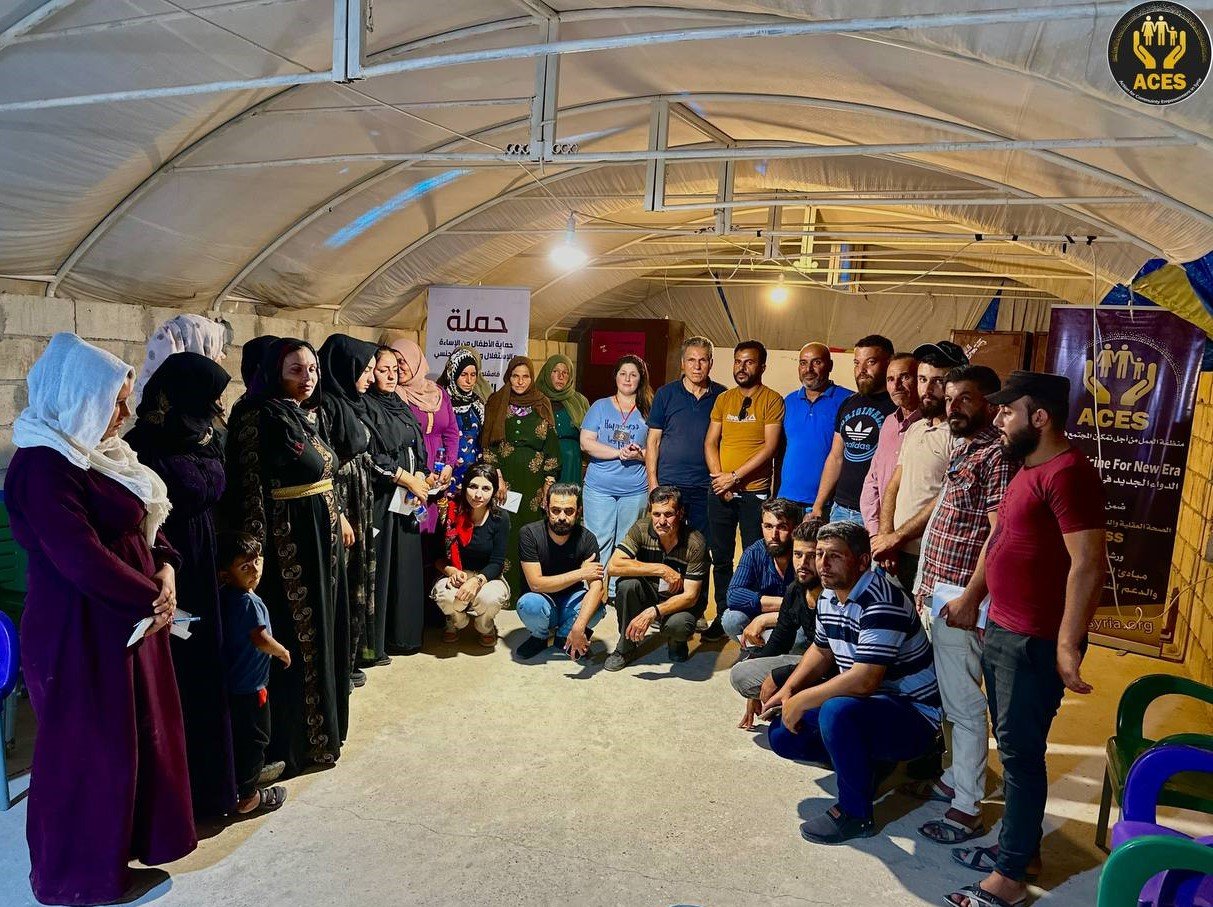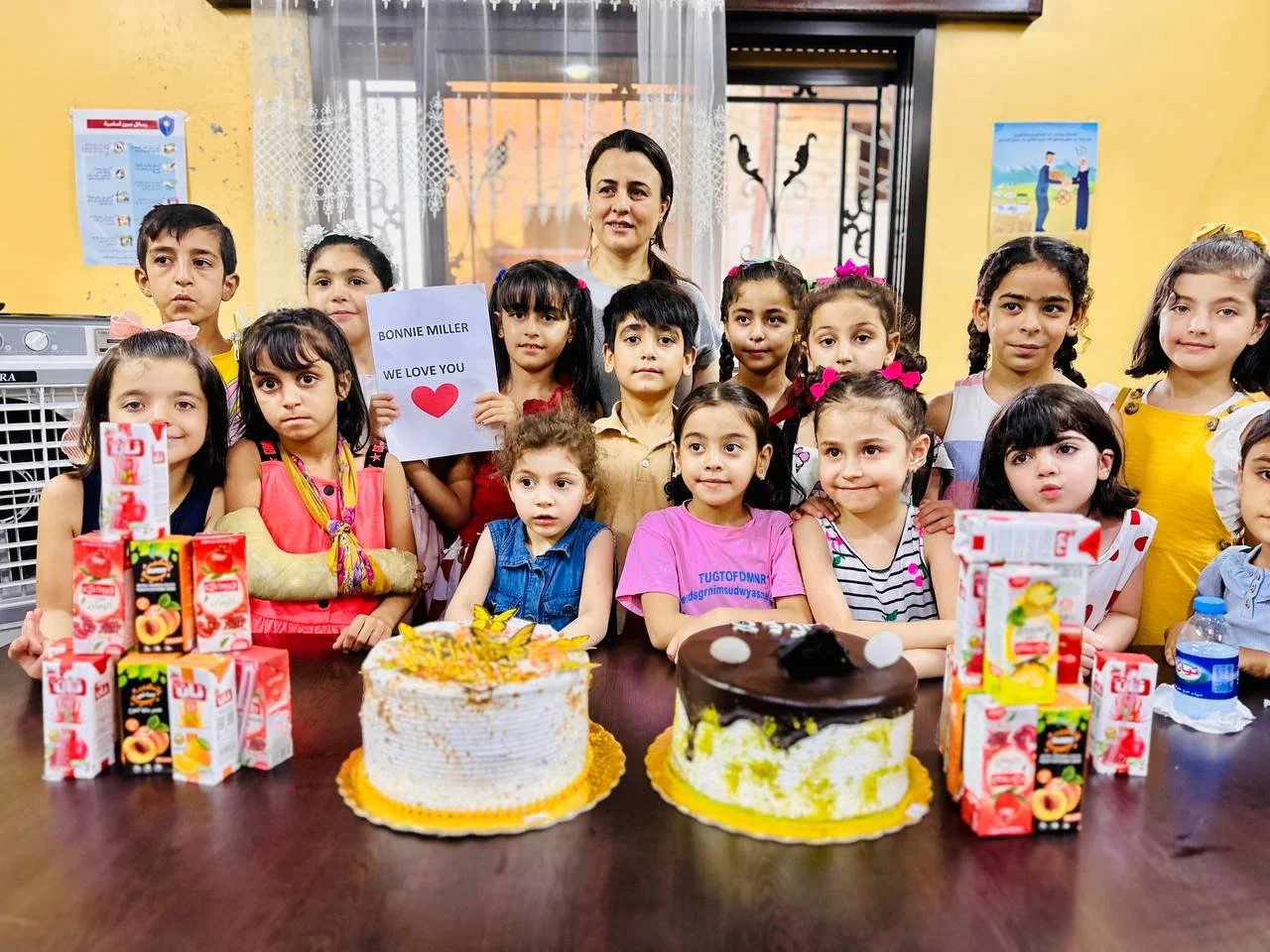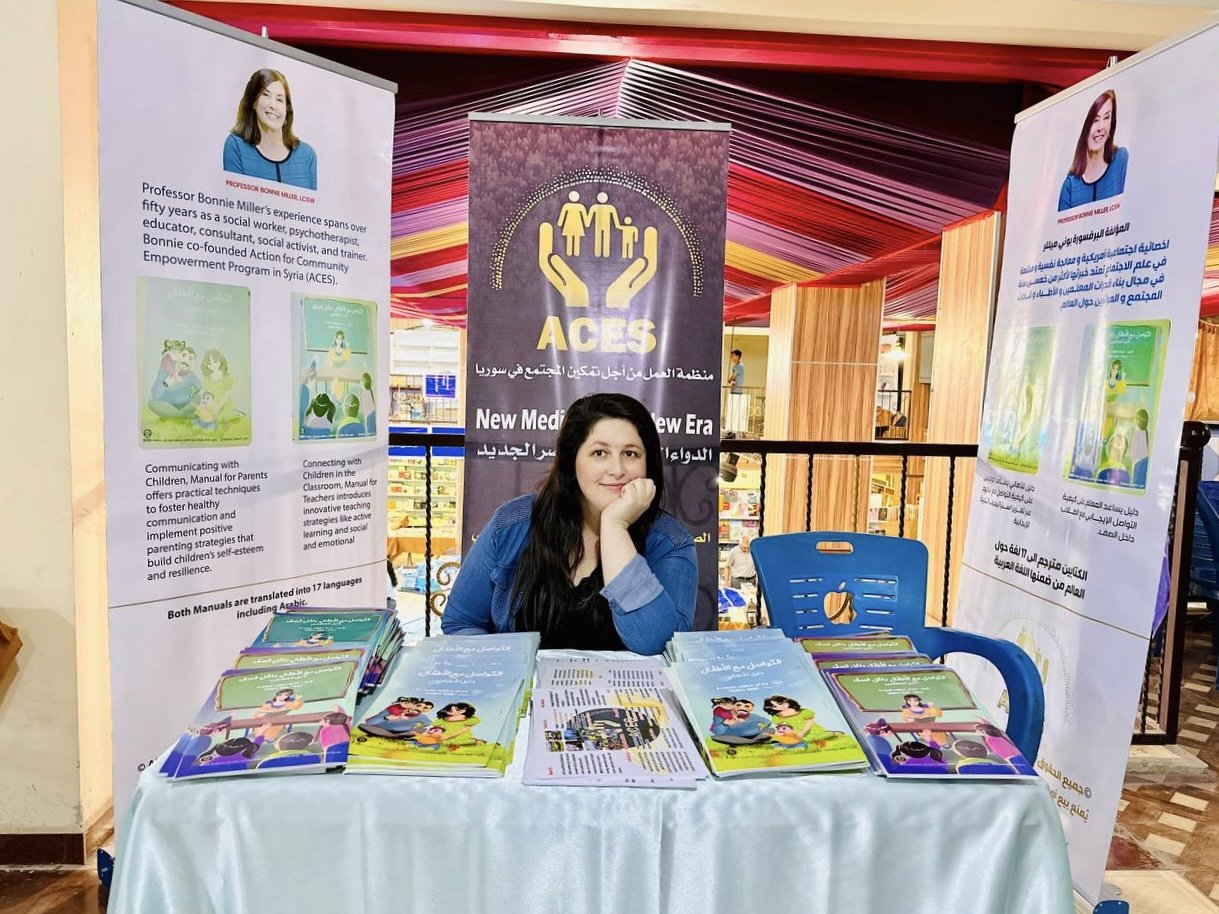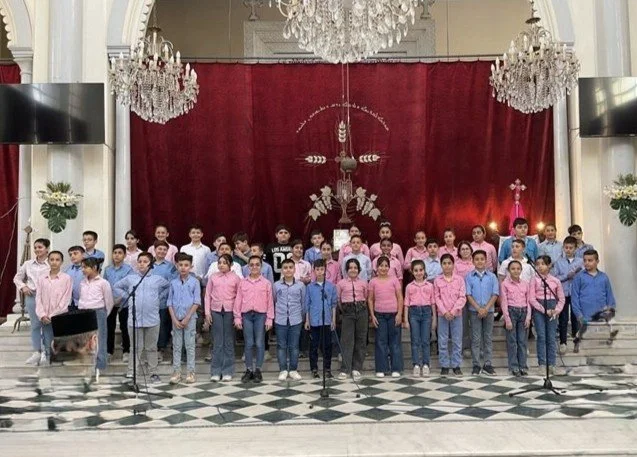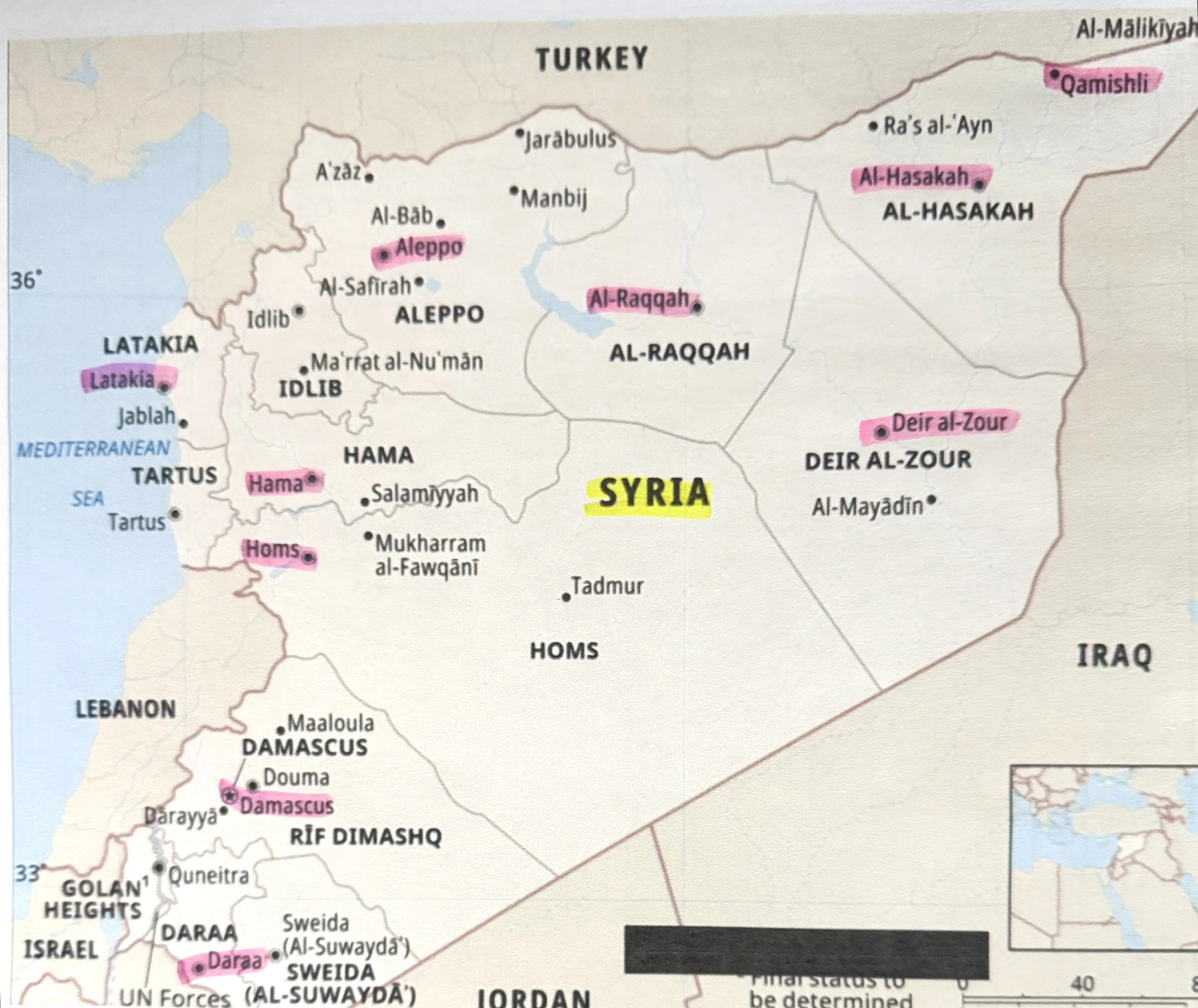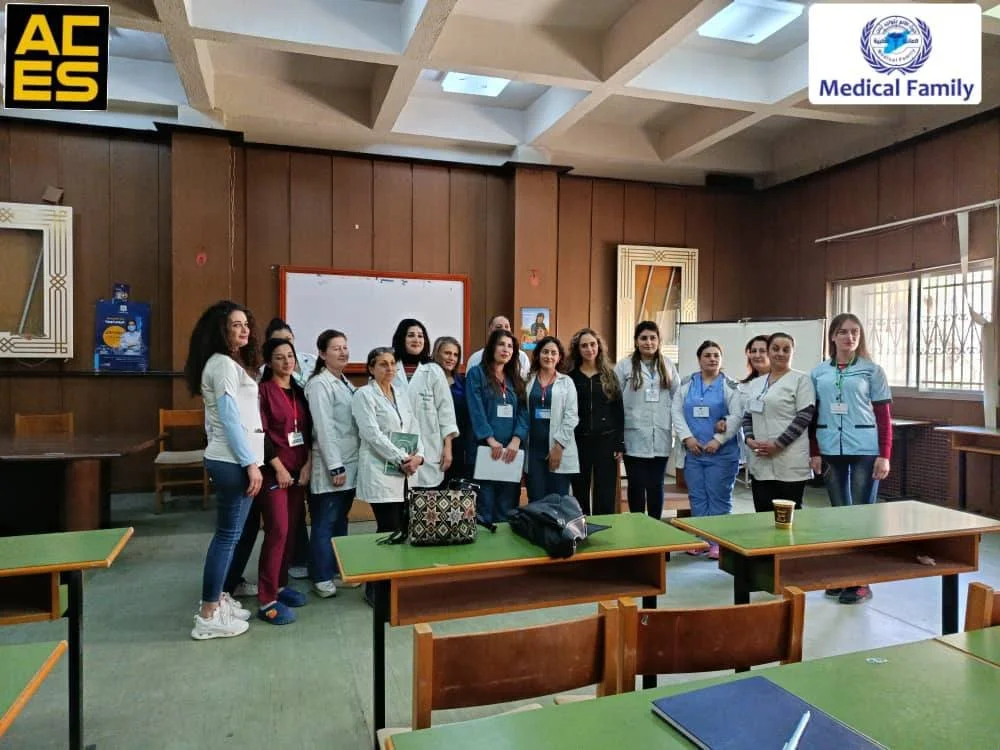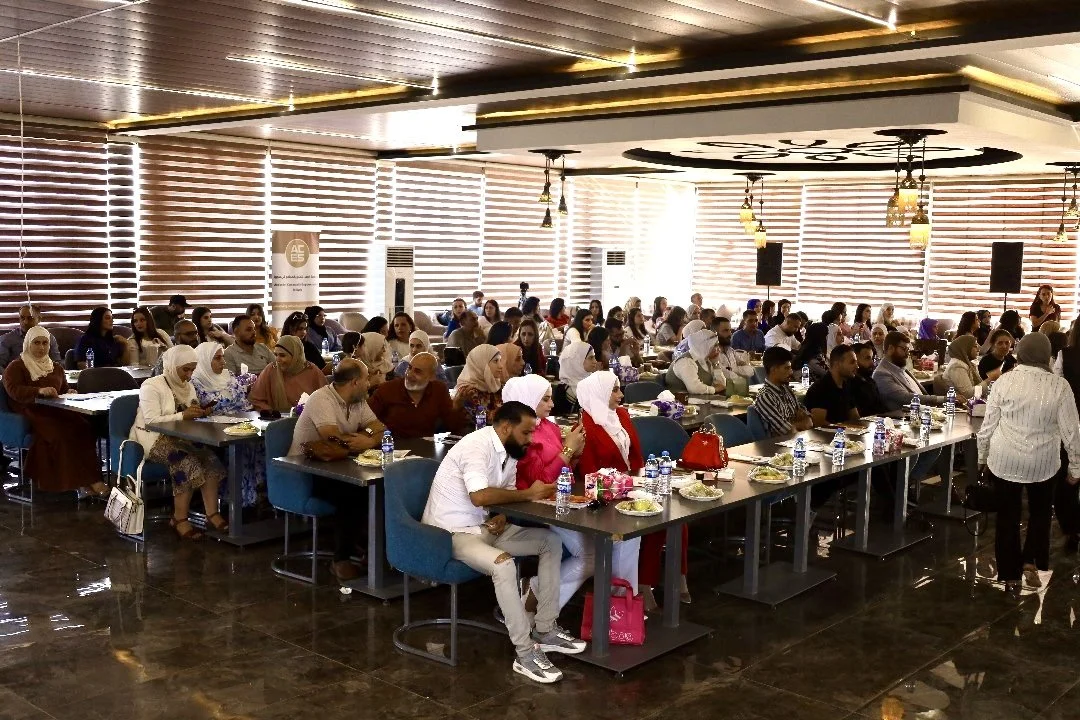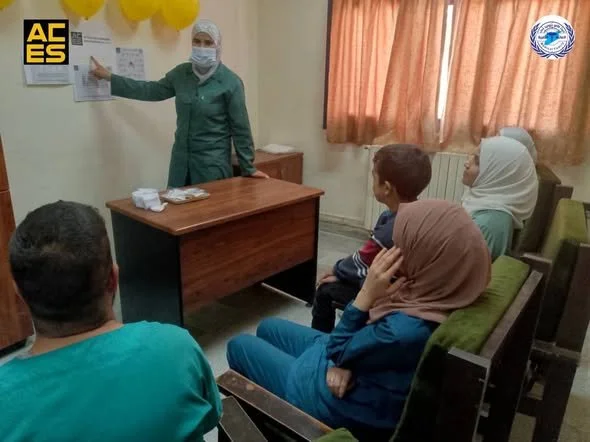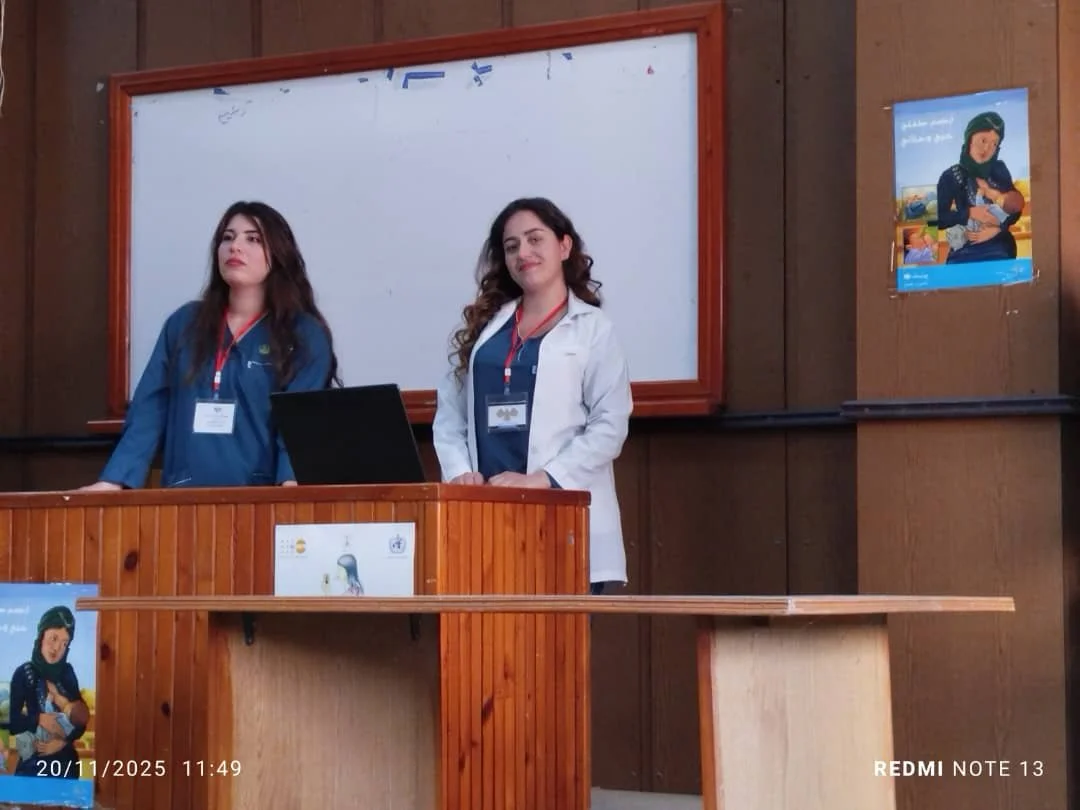About ACES
At ACES (Action for Community Empowerment in Syria), our training programs and campaign initiatives improve mental health and psychosocial support in northern Syria, particularly for communities affected by conflict, displacement, and oppression. Our focus extends to preventing domestic violence and child abuse and promoting peacebuilding, positive parenting, quality education, and gender equality.
Our Mission
Who We Are
ACES’ co-founder, Shiler Sido, is Executive Manager and Coordinator of all projects in northern Syria. She heads ACES’ team of local experts and serves as translator, interpreter, and facilitator of all training workshops.
Professor Bonnie Miller, Licensed Clinical Social Worker, is ACES’ co-founder, international trainer, and mental health program coordinator. She develops all mental health materials, and via Zoom from Washington DC, leads local in-person workshops and online training.
ACES has an energetic and highly effective local team who understand the issues, speak the languages, and are responsive to the needs of beneficiaries.
Background
Since the onset of the Syrian Civil War in 2011, the region has endured immense challenges—massacres by ISIS, Turkish invasions and ongoing shelling, and the devastating earthquake in February 2023. These events have severely disrupted access to essential services such as healthcare, education, and mental health support. Thousands of people remain displaced, with limited resources and uncertain futures, as the region continues to face crises on multiple fronts and uncertainty under Syria’s new government.
ACES works in the Autonomous Administration of North and East Syria, seen in the top map in red and in Deir ez-Zor.
However, since the fall of the Assad regime, ACES is now licensed in an all-Syria capacity.
Our Goals
Provide mental health and psychosocial support training for vulnerable populations.
Prevent domestic violence and child abuse and support survivors of maltreatment.
Build capacity in local communities through training healthcare professionals, educators, and community leaders.
Implement child protection programs and educational initiatives that promote positive mental health and resilience.
Involve local government agencies in developing policies and legislation that promote mental health and protect women and children from all forms of abuse.
Transform education by training thousands of teachers and school administrators in new teaching methods that enhance academic learning and psychosocial resilience of students.
Who We Serve
ACES serves diverse ethnicities across northern Syria, including Kurds, Arabs, Yezidis, Syriacs, Armenians, and others.
Our target groups include:
Healthcare professionals
Educators
NGOs and government agencies
Women’s groups
Community and religious leaders
People working with special needs children and adults
Our Programs
Empowering Communities through Mental Health Support and Abuse Prevention
ACES has successfully facilitated dozens of mental health workshops, both online and in-person, reaching thousands of participants across northern Syria. Our programs cover a wide range of topics, including stress management, trauma healing, and mental health support for special needs populations. In addition, we lead comprehensive community and internally displaced persons (IDP) camp campaigns to prevent child abuse and gender-based violence. These initiatives bring together community leaders, lawyers, NGOs, educators, local government officials, religious leaders, and healthcare professionals, creating a collaborative effort to build safer, more resilient communities.
Our 2025 projects are the first of their kind in Syria:
a) Trained 100 teachers, 50 of whom served as facilitators to train 3,000 educators in the underserved Deir Ezzor region
b) Trained 100 master teachers and school principals to train 1,500 of their colleagues in Qamishli and Hasakah.
c) Psychological First Aid and More: ACES trained 100 nurses from Syria’s most traumatized regions—areas devastated by the 13-year civil war, Turkish incursions, and ISIS. These nurses are now training over 1,000 of their healthcare professional colleagues in person, strengthening the country’s capacity to provide compassionate, effective care.
Our Impact
ACES’ programs have reached thousands of beneficiaries. We support vulnerable populations in Syria by:
· Building capacity of local communities by mobilizing collaborative relationships of civil society organizations to formulate solutions to pressing social problems.
· Encouraging social harmony in multiethnic populations of vulnerable minorities (Kurds, Armenians, Yezidis, Syriacs) as well as Arabs.
· Healing trauma and improving psychosocial well-being.
· Preventing child maltreatment by raising awareness, supporting families, and teaching positive parenting skills.
· Training educators in modern teaching methods for improved academic achievement and socioemotional growth in students.
· Strengthening resilience in adolescents and young adults by helping them develop coping skills to deal with stress and adversity.
· Empowering women leaders.
· Launching initiatives to prevent gender-based violence and help survivors.
· Advocating for the rights of women, children, minorities, and people with disabilities.
· Training over 1,000 healthcare professionals in Psychological First Aid to promote effective coping after crises and traumas.
· Achieving maximum impact with a high percentage of donations spent on program (and low overhead for administrative expenses).
Feedback from healthcare professionals in Northwest Syria:
“Getting into the medical field is difficult, but it becomes extra difficult after experiencing a war and genocide against our people. We deal with around 300,000 unwell displaced persons who suffer from physical and psychological illnesses on a daily basis. Both in terms of staffing and obtaining pharmaceuticals, our capacity as physicians and nurses is constrained.
Mrs. Bonnie Miller delivered programmed sessions that were like a torch in our gloomy existence. We used to conduct our work in a traditional manner, believing that we were doing it correctly, but these seminars marked a watershed moment in our lives. They altered our perceptions on how to better assist our patients, manage stress, aid ourselves and others, and prevent burnout. We feel more confident in our ability to be more effective and helpful in our community after the workshops. The workshops most crucially supplied us with solutions to our growing challenges.”
Feedback from teachers in Northwest Syria:
“No one can comprehend what it means to have hope after a lengthy period of hopelessness. No one can comprehend what it means to lose one's sense of self but then to rediscover one's zest for life. Only those who have been through the most harrowing combat experiences may comprehend what those emotions imply. The sessions demonstrate the power of healing, both mental and spiritual healing.
ACES’ ground-breaking workshops gave educators a comprehensive look into the student-teacher relationship, allowing them to build the finest ways for assisting students and detecting the concerns and problems that might harm students and teachers.
Participants believe that the sessions have enriched their lives and souls, and they have realized the importance of working harder, serving the community, particularly students, planting hope, knowledge, and confidence, but most importantly, restoring a smile to children's faces.”
Deir Ezzor Teacher Training Project Phase I
In November and December of 2024, ACES’ lead trainer, Professor Bonnie Miller, presented twelve 2.5 hour online sessions with interactive discussions for primary and secondary school teachers in Deir Ezzor, a region of Northeast Syria impacted by war and attacks by ISIS.
The training for 100 teachers was very relevant to their needs and highly successful, as evidenced by their testimonials:
“Thank you for this initiative aimed at empowering educators despite the challenges. This project is valuable for both teachers and students. The session covered resilience, emotional regulation, self-efficacy, and conflict resolution, all of which are vital for fostering positive development in children.”
“Regarding today's session, it was indeed of utmost importance. We face many problems at school but didn’t know how to deal with them or lacked solutions. Personally, I found solutions for many issues, whether at school or with my children at home.”
“The session was constructive, covering key topics like classroom management, fostering respect and cooperation, and tackling bullying in schools. The proposed solutions were practical and essential for enhancing teacher-student interactions.”
“The lecture was more than excellent and incredibly beneficial. I honestly needed such a lecture as it provided rich and valuable information…ACES’ sessions are comprehensive and inclusive, allowing the colleagues to share their opinions.”
“The session was truly rich with valuable and beneficial information for teachers, including strategies for classroom management and addressing each child’s behavior individually. I chose to listen attentively as the session was diverse and enriching. Through the professor’s explanations, all our queries were answered.”
“The session was highly informative and addressed issues relevant to all ages, not just teachers. Even as parents, my group and I found the topics discussed by the professor so captivating that we encouraged everyone to listen. This highlights the value of such sessions, not only in the educational field but in life overall.”
“Great effort, everyone. A valuable lecture with important topics on domestic and social violence against children. Real stories of violence experienced by children were shared. Honestly, we benefited greatly from the issues discussed.”
“God bless you for the valuable insights.”
Deir Ezzor Teacher Training Project Phases II and III
Spring-Summer 2025
Our 50 teacher facilitators trained 4,000 of their colleagues on topics such as interactive teaching methods, enhancing resilience in children, social and emotional learning, and parent-teacher collaboration in the most underserved regions of Deir Ezzor. This valuable, practical, and well-received training has been praised by teachers, parents, and the Ministry of Education. More than 100,000 students in Deir Ezzor will benefit from this project in the coming academic year.
Feedback From the Ministry of Education:
“We are deeply grateful for the opportunity to implement such educational program in the ruler areas of Deir Ezzor. The response from the community has been overwhelmingly positive, with many parents and local stakeholders expressing appreciation for the access to quality education that was previously unavailable in these underserved regions. The engagement of teachers and the enthusiasm they have shown towards learning new techniques presented by the expert Bonnie Miller highlight the need and demand for such programs.”
"In DEZ schools, students and teachers face immense challenges due to deficiencies of basic necessities. Many classrooms lack heating, forcing children to try to learn while enduring harsh winter conditions. Despite the severe weather, students attend school with unwavering determination.”
Feedback from Facilitators:
“The training was like a window of hope, as we realized the true need for such sensitive topics in our educational environment. Everything we learned will positively impact the future of children and contribute to creating a safer school environment. We are grateful to Prof. Bonnie Miller and I am lucky to be trained by her.”
“Our joy with this training is indescribable; it has completely changed my perspective on education. The information provided by Professor Bonnie Miller was deep and inspiring, and I feel proud to now share it with teachers and parents.”
“What we learned during these weeks will stay with us throughout our professional lives. It is a life changing experience given to us by ACES and Prof. Bonnie Miller.”
“The training was not just about educational sessions; it was an experience that changed our concepts and methods of dealing with students. I have become more confident in myself and now possess the tools I was missing.”
"Being part of this training project has been a truly enriching experience. It has given me the opportunity to share knowledge, learn from others, and contribute to the development of educators in Deir Ezzor. I am proud of what we have accomplished together."
"This has been one of the most rewarding experiences of my career. Assisting teachers and witnessing their progress has brought me great joy and a deep sense of responsibility. I am grateful for what we’ve achieved, and I look forward to seeing how these skills will shape the future of education in our region. Thank you ACES and Prof. Miller."
"Being a woman facilitator in this project has been a memorable journey. It has allowed me to connect with passionate female educators and support them in adopting innovative teaching methods. The success we’ve seen has filled me with pride…I carry hope and motivation for continuous positive change. We’ve planted seeds that will hopefully grow into a lasting educational transformation. Thank you ACES and Prof. Bonnie Miller."
“Education is the key to development and progress. We have suffered and were impacted by so many strict ideas imposed on us by ISIS. Our children deserve to have the best education possible and we thank the ACES team because they thought about us. We are also grateful to Prof. Bonnie Miller, who helped thousands of teachers in the region with her important materials.”
“Girls who live in rural areas are overlooked, and many people forget about them because they live far away, but education for girls is necessary and important and I think everyone should have the right to education. From the very first session I realized a difference with my thoughts. I thank ACES and its team and also special thanks to Prof. Bonnie Miller who is thinking about us and is helping our region.”
"These sessions didn’t just teach us about stress—they showed us how to reclaim our joy and energy."
"For the first time, I feel equipped to handle the emotional challenges of teaching in a crisis zone."
"Hearing other teachers share their struggles made me feel less alone. We’re planning to start a weekly check-in group to keep this momentum going."
Feedback from Trainee Teachers:
“I used to think that dealing with children was a straightforward matter, but after this training, I realized how sensitive it is. I was unaware of how listening to children affects their behavior and self-confidence. Now, I allocate time within the lesson to listen to my students.”
“I never imagined that there were people who care about us as teachers to this extent. Every teacher deserves to learn these skills.”
“I have participated in many training courses, but this training was different. The topics covered were profound and touched on our real-life situations, especially regarding bullying and child sexual abuse. Professor Bonnie Miller deserves all the appreciation, as she changed the way we think.”
"The training provided a great foundation for us to improve our teaching methods. I feel more confident now in applying interactive and SEL strategies in my classroom. It is really sad to come to the end of these great times we spent learning every week, I will miss my friends who were great facilitators who helped us a lot. Big thanks to ACES and Prof. Bonnie Miller.”
"The project was very beneficial, especially in introducing new techniques for engaging students and managing diverse needs. I noticed a positive change in student behavior and participation. I want to thank ACES and Prof. Bonnie Miller for working in our area. It was a very new project to all of us and we will try to work on the ideas we gained all the time.”
"This initiative has been a turning point in my teaching approach. The methods I learned have made lessons more interactive and meaningful for my students. I feel confident now, and I worry less about my class and how to deal with my students. ACES and Prof. Miller did an excellent job of preparing the facilitators.”
“Education is the key to development and progress. We have suffered and were impacted by so many strict ideas imposed on us by ISIS. Our children deserve to have the best education possible, and we thank ACES team because they thought about us. We are also grateful to Prof. Bonnie Miller, who helped thousands of teachers in the region with her important materials.”
“From the very first session I realized a difference with my thoughts. I thank ACES and its team and also special thanks to Prof. Bonnie Miller who is thinking about us and is helping our region.”
"This session gave me a fresh perspective on how to approach learning and build on communication as a key to positive teaching. I especially liked the part about active listening and learning styles. It will definitely help me improve my ways of teaching."
"Before these sessions, I didn’t realize how important it is to connect with students who had experienced trauma. Now, I will be able to use active listening and clearer language to make them feel safe.”
"Learning how to adapt my communication for different ages and backgrounds is a game-changer. Hopefully parents can approach me more when they see the different me with the new academic year."
"The participatory methods we learned—like group discussions and role-playing—will bring my classroom to life. I am so excited to meet my students for the new academic year.”
"We may lack adequate schools, but we’re rich in ideas now. I will start training other teachers and parents in my village because no one should miss this knowledge."
"I used to think facilitation was just about delivering content. Now I see it’s about creating a space where every child feels valued. The ‘feedback circle’ technique will become my favorite tool."
"These sessions didn’t just teach me skills—they restored my confidence as a teacher. I now believe I can truly make a difference, even with limited resources."
Mental Health Month May 2025
Our Activities:
1) Facebook Mental Health Campaign – throughout the month
2) Peacebuilding and Mental Health Forum – May 19
100 in-person participants (community leaders, NGOs, etc.) in an interactive forum in Qamishli
3) Wellness Day in Nature event in Qamishli park – May 25
Breathing, movement, dancing, imagery and other activities highlighting wellbeing, for over 200 participants ages 7 and up.
4) How Syria’s Youth Can Be Peacebuilders – May 26
Youth NGOs – 30+ participants at an in-person workshop at ACES’ office in Qamishli, mostly minorities: Kurds, Alawite, Druze, Armenians as well as Arabs. Bonnie on Zoom and Shiler interpreting and leading activities and discussion covering mental health, communication, management of emotions, and conflict resolution.
School Principals and Master Teachers Train-the-Trainer Program
Throughout the summer of 2025, Professor Bonnie Miller and ACES’ Executive Director, Shiler Sido, trained 113 school principals and master teachers in Qamishli and Hasakah to serve as facilitators to train over 1,500 of their colleagues from 70 schools, impacting over 28,600 students during the coming school year.
The 16-session online training included topics of active and interactive learning, social and emotional learning, resilience and healing from trauma. mental health issues, substance abuse prevention, learning and attention difficulties, autism, classroom management and prevention of bullying, child abuse prevention, conflict resolution and peacebuilding, collaboration between schools and families, and self-care for educators. All participants were given dozens of power point presentations, handouts, surveys, and Bonnie Miller’s manuals for parents and teachers. Some feedback:
Educator and Former High School Principal
"After 26 years of dedicating my life to education—first as a teacher and later as a principal—I thought I had encountered every facet of this noble profession. But my journey took an extraordinary turn when I had the privilege of learning from Professor Bonnie. This experience was nothing short of transformative, reshaping not just my understanding of education but the very essence of my 26-year career.
Professor Bonnie’s insights opened doors to perspectives I had never imagined, let alone discussed. The depth of knowledge she shared was like uncovering a hidden treasure—one that illuminated the profound layers of teaching and learning I had overlooked. Her guidance didn’t just add to my expertise; it breathed new life into my passion for education, revealing meanings and connections I had never considered.
Today, I stand as a teacher once again, but with a heart and mind renewed. The wisdom I gained from Professor Bonnie has redefined my approach, allowing me to see my students, my colleagues, and even my own role with fresh eyes. It’s as if the past 26 years were a prelude to this moment of clarity and purpose.
To Professor Bonnie, I offer my deepest gratitude. You have not only enriched my professional journey but also touched my soul as an educator. This is more than knowledge—it’s a gift that will continue to inspire generations of learners through me. Thank you for showing me that even after decades in the classroom, there is always more to discover, more to feel, and more to give."
Educator with 15 Years of Experience Teaching All Grade Levels
As I sit here reflecting on the past two months, I am overwhelmed with emotions—gratitude, inspiration, and even a touch of sadness that this transformative training has come to an end. In my nearly 15 years as an educator, I have attended countless workshops and training sessions, but none have left such an indelible mark on my heart and mind as this one.
From the very first day, it was clear that this experience was unlike anything I had encountered before. The depth of knowledge, the clarity of vision, and the sheer passion poured into every session by Professor Bonnie were nothing short of extraordinary. For the first time in my career, I felt like I was not just learning new techniques but truly understanding the soul of education. Every lesson, every discussion, and every moment spent under her guidance felt like uncovering a hidden treasure—one that had been waiting for me all along.
What made this journey even more special was sharing it with my mother, a retired teacher and a lifelong educator herself. Witnessing her excitement and engagement was a rare and beautiful gift. She, who has seen decades of educational trends come and go, was captivated by Professor Bonnie’s wisdom, her insightful answers, and above all, her patience. My mother turned to me one day and said, ‘Every second spent listening to her is worth it.’ Coming from someone who has dedicated her life to teaching, this was the highest praise imaginable.
And then there was the ACES team—especially Shiler—whose kindness, professionalism, and unwavering support made this experience feel like more than just a training. It felt like a community, a family of like-minded educators united by a shared purpose. The way they handled every detail with such grace and warmth added a layer of comfort and joy to the entire process.
To Professor Bonnie and the entire ACES team, I say thank you—not just for the knowledge you’ve imparted, but for reigniting my passion for teaching and reminding me why I chose this path in the first place. You’ve given me tools, yes, but also something far more precious: a renewed sense of purpose and the courage to dream bigger for my students.
This training was not just an event; it was a milestone in my journey as an educator. And for that, I will forever be grateful."
Conference for the Participants of the Teacher Training Project
September 27, 2025
One hundred thirteen participating teachers and school principals from 70 schools successfully passed rigorous examinations to become certified facilitators. They are now prepared to train 1,500 of their colleagues in the innovative methods and critical topics covered during the program.
To mark the conclusion of the training, the newly certified facilitators joined community leaders, media representatives, and ACES' staff at a final conference. Together, they reflected on the program’s impact and collaborated to develop key recommendations for the Northeast Syria Ministry of Education. The forum aimed to provide a comprehensive overview of the educational situation in Syria in 2025, focusing on the current challenges faced by students and educators. Dozens of recommendations by the teachers and principals will be presented to the Ministry of Education this fall.
Psychological First Aid Training for Healthcare Professionals
Fall 2025
In the first of its kind initiative for all of Syria, ACES’ Psychological First Aid and More program trained 76 nurse facilitators in essential mental health and psychosocial support skills. These nurses in turn trained over 1,000 of their medical colleagues to become better equipped to support their patients, their colleagues, and themselves—helping to rebuild community resilience within an overstressed healthcare system.
· Train-the-Trainer Model for nurses to train their healthcare colleagues
· Psychological First Aid for Adults and Children
· Stress, Coping, Self-care for Patients and Healthcare Providers
· Identification of Risk Factors and Psychosocial and Health Conditions
· Referral Resources Mapping for all of Syria
· Sustainability via ongoing support groups and support from ACES
We are enthusiastically pursuing partnerships with local and international NGOs and applying for grants to continue our mental health, protection, healthcare, substance abuse prevention and treatment, and education programs in all areas Syria.
Looking Ahead
